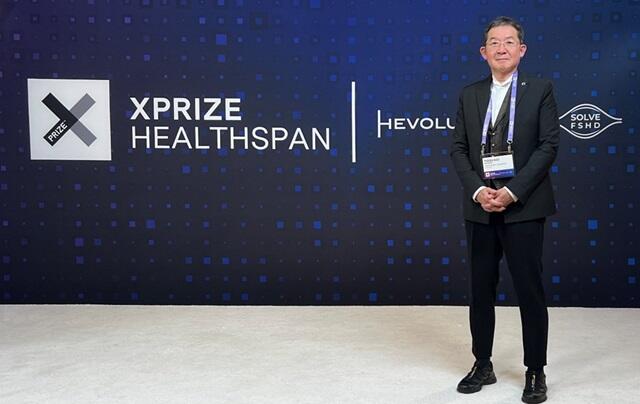Treatment will be developed to restore muscle strength, cognitive function, and immune function of individuals aged 50-80 by at least 10 years, and ideally up to 20 years within a year. A joint research team including Professor Toshio Miyata from Tohoku University Graduate School of Medicine, Renascience, Tokai University, Hiroshima University, and Northwestern University has been selected as a semifinalist (TOP 40) in the "XPRIZE Healthspan" global competition hosted by the XPRIZE Foundation, which aims to extend healthy lifespans. Miyata proposed a concept for a novel low-molecular weight drug which removes senescent cells and suppresses age-related diseases without promoting cancer (senolytic drug) through PAI-1 inhibitors developed 20 years ago. The research group plans to conduct clinical trials on patients with lifestyle-related diseases at Tohoku University Hospital and advance to the competition's second stage.

Advances in living environments and medical care have nearly doubled the average life expectancy of Japanese people over the past 100 years, up to around 83 years. However, the gap between average life expectancy and healthy life expectancy has also widened. According to the Ministry of Health, Labour and Welfare, in 2022, the difference between life expectancy and healthy life expectancy was 8.47 years for men and 11.64 years for women. A similar trend exists globally, with the United States showing a gap of about 10 years between average life expectancy and healthy life expectancy.
The XPRIZE Healthspan is a competition with a total prize of $101 million, challenging teams to develop accessible treatment solutions to this problem. Over 600 teams from 58 countries entered, with more than 200 submissions. Each of the top 40 selected teams was awarded $250,000.
About 20 years ago, Miyata developed PAI-1 inhibitors. PAI-1 (Plasminogen Activator Inhibitor-1) is a protein that increases with cell aging. Mouse experiments showed that inhibiting PAI-1 could not only improve various age-related diseases but also extend lifespan.
It has been found that PAI-1 increases not only in senescent cells but also in cancer cells. Clinical trials have shown that adding PAI-1 inhibitors can enhance treatment effectiveness for treatment-resistant melanoma that does not respond to traditional immune checkpoint inhibitor combination therapy. Clinical trials of combination therapy with immune checkpoint inhibitors are currently underway for non-small cell lung cancer, with no severe side effects reported.
Mouse experiments have demonstrated effects on various age-related diseases including pulmonary emphysema, osteoporosis, Alzheimer's disease, arteriosclerosis, diabetes, and chronic kidney disease.
The research team will conduct clinical trials of PAI-1 inhibitors on patients with lifestyle-related diseases such as diabetes at Tohoku University Hospital from August this year to March 2026. They will submit the results as a semifinal clinical trial report. Based on these results, the TOP 10 teams (finalists) are expected to be announced in autumn 2026, with a prize of $1 million awarded to the winners.
The finalists will conduct four years of clinical research for the final competition. Afterward, the most outstanding research team among the finalists will be selected for the grand prize, with awards up to $8.1 million based on their achievements.
World first: High expectations for "PAI-1 inhibitor" human clinical research
Miyata commented: "Unlike typical medications, clinical trials for anti-aging face numerous challenges and high barriers. Conventional drugs (such as melanoma treatment drugs) target patients with specific diseases (melanoma). In contrast, the XPRIZE Healthspan anti-aging clinical research targets a broad range of elderly individuals who have multiple different lifestyle-related diseases, resulting in significantly varying disease backgrounds for each patient. Evaluating anti-aging effectiveness typically requires a considerable period, but XPRIZE Healthspan demands assessment of treatment effects within a short timeframe of a few months (semifinals) and approximately one year (finals). Furthermore, there are no clear objective, scientific evaluation criteria (endpoints) for assessing anti-aging effectiveness on organs or individuals."
"Therefore, conducting clinical research to confirm anti-aging effects in humans is extremely challenging. In this XPRIZE Healthspan, participants focus on evaluating several specific bodily functions such as immunity, muscle, and cognitive function, using evaluation indicators established by the judging committee. While many challenges exist, it is an undeniable fact that we must collectively address them as we enter a super-aging society."
"Previously, anti-aging research was primarily conducted on mice, but this XPRIZE Healthspan will, for the first time, implement global-scale clinical research involving humans. This initiative is expected to accelerate the scientific, objective, and rational development of human anti-aging treatments. While immediate breakthrough results will be difficult, the significance of such attempts is unquestionable. Personally, I want to advance research to determine how we can solve the greatest medical challenge of healthy longevity and explore the extent to which this can be achieved through medication. I hope to find clues to pioneering a new field of research."
This article has been translated by JST with permission from The Science News Ltd. (https://sci-news.co.jp/). Unauthorized reproduction of the article and photographs is prohibited.




